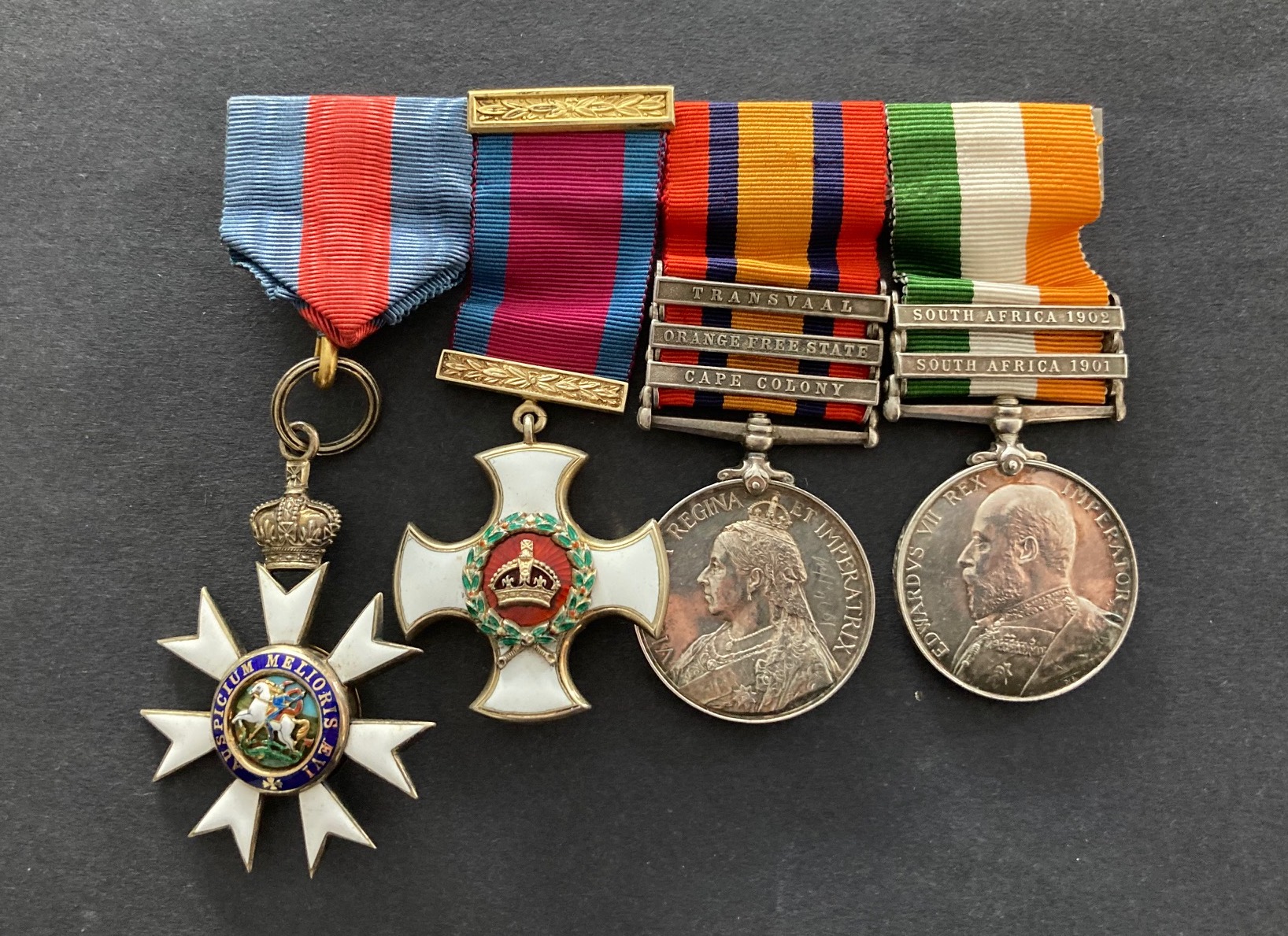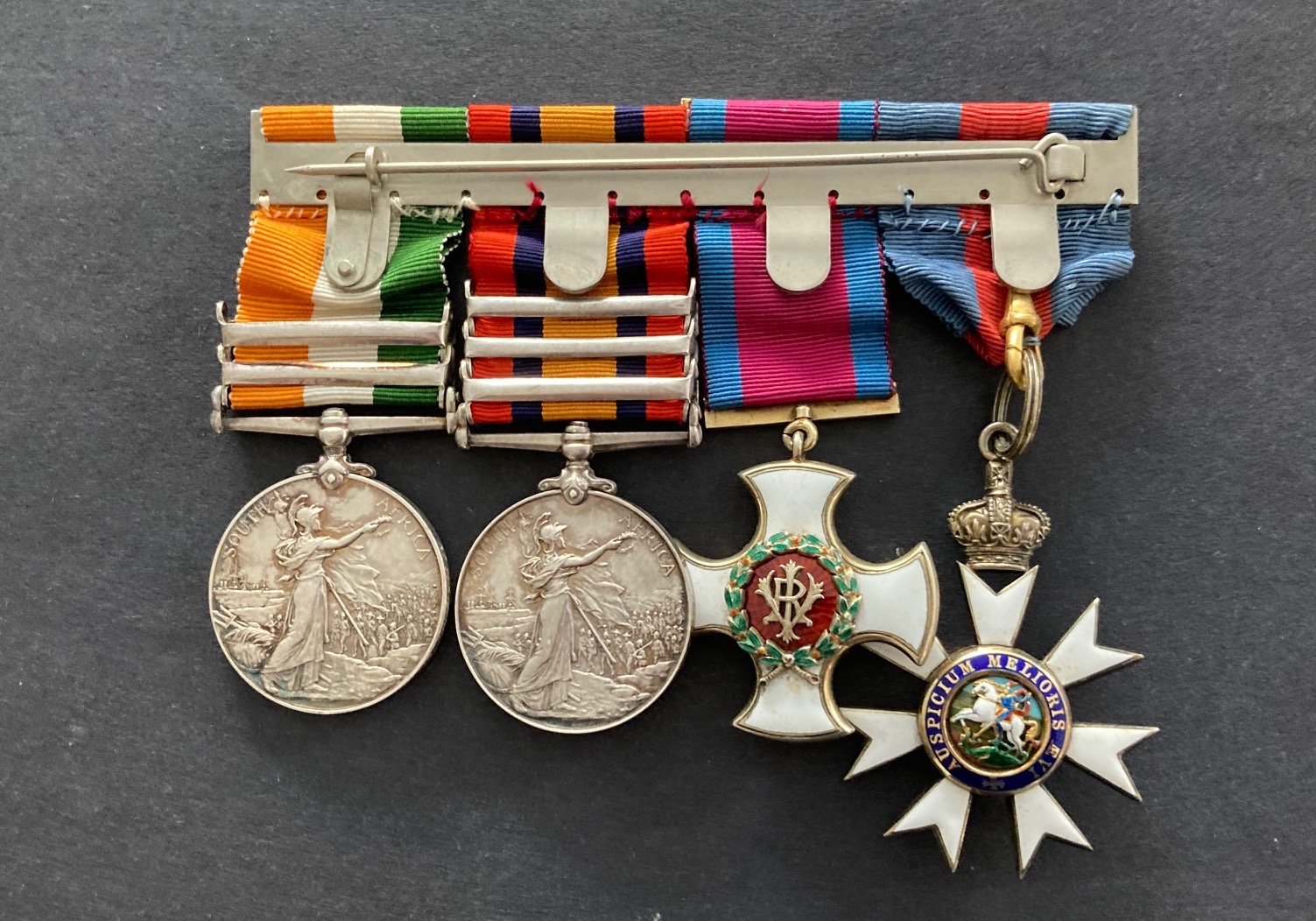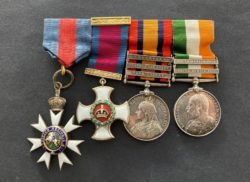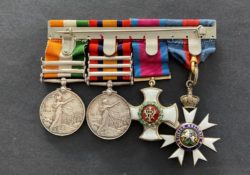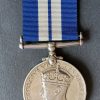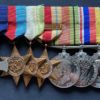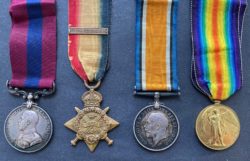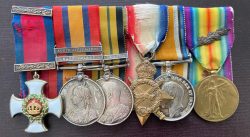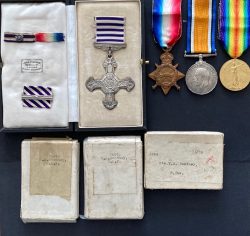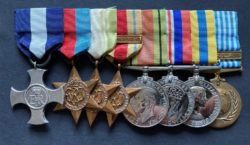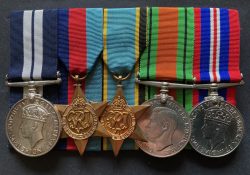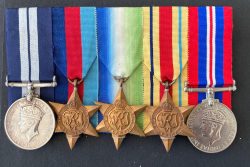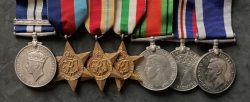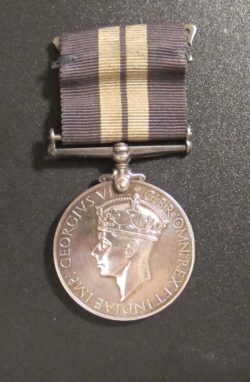A Great War C.M.G. ‘Victorian ‘D.S.O.’ group , Lieutenant-Colonel , Nottinghamshire and Derbyshire Regiment, late commanding Dublin Imperial Yeomanry. An escaped prisoner of war in the Boer War. Mentioned in despatches , (later awarded the DSO for great gallantry when greatly outnumbered in holding off a Boer force and bringing his convoy out despite heavy losses
£1,850.00
Out of stock
C.M.G., Companion’s, neck badge, silver-gilt and enamels, D.S.O. (VR), Q.S.A., 3 clasps, Cape Colony, Orange Free State, Transvaal (Major Imp: Yeo:), K.S.A., 2 clasps, S.A.1901, S.A.1902 (Major Imp. Yeo.)
Lieutenant-Colonel J. F. Humby, D.S.O., Nottinghamshire and Derbyshire Regiment, late commanding Dublin Imperial Yeomanry
Mounted for wear.
Note The D.S.O. is a fine, contemporary jewellers copy. The suspension appears original and presumably the original badge parted company at some point.
C.M.G. London Gazette 3 June 1916.
D.S.O. London Gazette 31 October 1902: ‘James Frederick Humby, Captain, 8th Battalion Imperial Yeomanry; Major, 3rd Battalion The Royal Irish Rifles. In recognition of services during the operations in South Africa.’
M.I.D. L.G. 15/11/1901 (Kitchener’s despatch 8/10/1901 “The 74th (Irish) Squadron, ‘Imperial Yeomanry, under Captain Humby, behaved with great gallantry and determination. Though outnumbered by 400 Boers, who surrounded the convoy, and pressed to close •quarters, our men held their ground and offered such a stubborn resistance, that at nightfall the enemy abandoned the attack and withdrew. On the following day Captain Humby, who did not lose a single wagon, took his convoy safely into Griquatown, but his losses were extremely heavy. Nine men of the escort were killed, and 2 Officers and 21men were wounded.’
From a source
‘At this point the reputation of the Imperial Yeomanry was once again saved by the outstanding bravery displayed by on of its units in the field, the gallant defence of a convoy at Rooikopjes, outside Griquatown, by men of the 74th (Dublin) Company on 24th August 1901. The two mile long convoy was transporting food to the remote town of Griquatown in the north-west of Cape Colony, which was surrounded by Boer commandos and in urgent need of supplies. The convoy was escorted by the 100 strong 74th Company, commanded by a Captain James Humby, who had himself been taken prisoner at Lindley the previous year. When the convoy was attacked by several hundred Boers, Captain Humby quickly laagered the wagons. At the same time he ordered the Irish yeomanry to seize a ridge which overlooked the convoy and provide covering fire. This they did, holding it throughout the whole of the following night, during which they were involved in intense close- quarter fighting. During the defence of the convoy, the Dublin Company lost 7 men killed and 25 wounded, two of the wounded later dying.’
The Lindley Affair, the Capture of the 13th Battalion Imperial Yeomanry by the Boers.
The 13th Battalion Imperial Yeomanry, with two Colt guns, comprised the 47th Company (the Duke of Cambridge’s Own) under Capt C S Keith and the three Irish companies: the 46th under Capt R A Maude, the 54th under Capt J F Humby, and the 45th under Capt the Earl of Longford. After holding Lindley for 4 days against superior Boer odds and well capable of holding pending the arrival of a relief column the position fell by strange circumstance.
Between the two koppies was a small post of a few men, one of whom decided to raise the white flag as a token of surrender. This man was shot by his comrades. Reinforcements from the 54th Company arrived, but it was too late to save the position . With the southern koppie already in Boer hands, Lt Robin, under the mistaken notion that he was bound by the white flag of his subordinate, ordered a ceasefire. This brought the valley in which the transport was parked into Boer hands. The remainder of the British position became untenable. Seeing the futility of further effort, Colonel Spragge also surrendered. Lord Longford, with the 45th Company to the north, and Capt Maude, with the 46th Company in the west, held out for a little longer but they too finally surrendered. All firing ceased at about 14.00.
Originally Humby was held prisoner along with the other officers and men of the 13th were held at Airlie POW camp. On 13 August 1900 due to the awful conditions some 1,700 British prisoners were freed by Gen B.J. Viljoen. The 47 officers however were held and transported to Barberton. Humby is recorded as escaped at Nooitgedacht (some 120 miles from Barberton whilst presumably on route) on the 30th August , 1900.
M.I.D. London Gazette 15 June 1916.
James Frederick Humby was born on 21 July 1860, son of Fred Peter Humby, of Southbroom, Devizes, Wiltshire. Educated in Paris, he joined the 3rd Battalion, Royal Irish Rifles, as Second Lieutenant, in 1891, and became Captain in 1896. He served in the South African War, 1900-2; commanded the 54th (Ulster) Imperial Yeomanry from February 1900. He took part in the operations in Orange Free State, February to May 1900; operations in the Transvaal, east of Pretoria, July to 29 November 1900; operations in Orange River Colony and Cape Colony 30 November 1900 to 31 May 1902. He was taken prisoner at Lindley with the 13th Battalion, but escaped 30 August 1900. He became Major in 1901, and commanded the 74th (Dublin) Imperial Yeomanry from June 1901; 8th Battalion Imperial Yeomanry from May 1902. He was twice mentioned in despatches; received the Queen’s Medal with four clasps; the King’s Medal with two clasps, and was created a Companion of the Distinguished Service Order. Lieutenant Colonel J. F. Humby served in the European War in command of the 12th Battalion, Nottinghamshire and Derbyshire Regiment in France from 30 August 1915, and was created a C.M.G. in 1916 for his services.
Probably mounted for wear prior to the issue of his Great War medals
